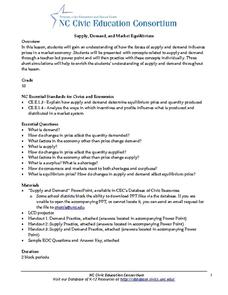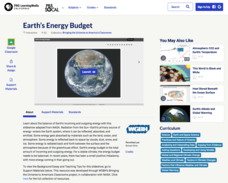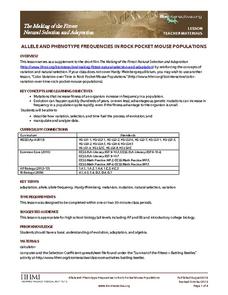Royal Society of Chemistry
Equilibria—Gifted and Talented Chemistry
Teaching is a balancing act! Keep things on an even keel with a comprehensive equilibrium lesson plan. The resource covers reversible and irreversible reactions, Le Chatelier's Principle, and the industrial applications of equilibrium...
Carolina K-12
Supply, Demand, and Market Equilibrium
An auction simulation, PowerPoint presentation, and candy M&Ms® are the perfect tools to help your learners understand the concept of supply, demand, and diminishing marginal utility. Here you'll find a thorough lesson plan that...
PBS
Earth’s Energy Budget
Is Earth's energy flow a little off balance? Explore our energy budget using a click-through interactive. Scholars discover the many factors that move solar energy around the planet and why the system is no longer in equilibrium.
Federal Reserve Bank
Prices: The Marketplace’s Communication System
Explore the dual role of prices as signals and incentives, and discover how prices are determined by buyers and sellers in the United States economy.
Curated OER
Kinetics and Equilibrium
Students develop an understanding of what a reaction is and factors that affect it. They are introduced to: reaction mechanisms, reaction rates, reaction order, factors affecting reaction rates, Le Chatelier's Principle and Equilibrium.
Curated OER
A LOT OF THIS FOR A LITTLE OF THAT
Students describe the import and export of agricultural products and gain a comprehension of the concept of supply and demand. They discuss exports and imports. Students have small world maps on each desk, they identify the countries...
Curated OER
Reaction rates and Equilibrium
Students listen to a lecture on the collision theory. They discuss the reactant and product changes during a chemical reaction. Students are taught the factors affecting reaction rates. They complete a lab on entropy, heat and free...
University of Texas
Lives of Stars
Stars exist from a few million years to over 10 billion years, depending on their mass. Scholars perform a play acting as stars to learn about their different life cycles. They develop an understanding of many of the fundamental concepts...
Constitutional Rights Foundation
Unemployment and the Future of Jobs in America
Unemployment: The job of the future. The resource, designed for high school scholars, explains unemployment rates, recessions, and job trends that are impacting employment in the United States. Academics explore potential careers of the...
Curated OER
Ice Ain't Easy
Students are introduced to the laws of thermodynamics. The 1st law of thermodynamics states that the energy must be conserved when two objects of different temperatures come in contact. If one object gains energy, the other object must...
Curated OER
Acids and Bases
Students comprehend the basics of acid and base chemistry, with an emphasis on computation and equilibrium. They are introduced to the following concepts: Arrhenius, Bronsted-Lowry, Lewis definitions, Hydrogen Ion equilibrium, and...
Chicago Botanic Garden
Micro-GEEBITT Climate Activity
A truly hands-on and inquiry based learning activity bridges all the lessons in the series together. Beginning with a discussion on average global temperatures, young meteorologists use real-world data to analyze climate trends in order...
DiscoverE
Pilot a Balloon
Balloons will go where you want them to. Young pilots first add paper clips to a balloon to make it neutrally buoyant. They then use cardboard to steer the balloon in different directions, taking air pressure into account.
DiscoverE
Friction in Action
There's no need to have friction among instructors regarding the resource. Pupils investigate how marbles and coins slide along different surfaces which gives them information to estimate coefficients of friction.
Curated OER
Shaping the View: Symmetry and Balance
Students explore the symmetry and balance in the composition of a variety of art works and note how the viewer's eye is guided to the important components of the image. How these elements affect the tone of the painting and communicate...
Curated OER
Earth Day Unit Plan: Pollution in the Anacostia River - Biology Teaching Thesis
Sixth graders are able to explain that there are pollutants in the Anacostia River, what these pollutants can cause, and how to prevent further pollution. They examine the impacts that the pollutants of the Anacostia River could have on...
Curated OER
What Does Earth Day Mean? - Biology Teaching Thesis
Young scholars possible sources of water pollution, and explain the effects that water pollution can have on the food on the food chain. They Name human and other animal (i.e. fish) illnesses that can be contracted from drinking polluted...
Curated OER
Nutrition -- A Lesson for Life - Biology Teaching Thesis
Students briefly explain the importance of nutrition in their everyday lives, and they tell you about how many calories they should consume in a day. They list readily available and affordable healthy foods that they LIKE to eat....
Council for Economic Education
A Lesson on the Supply and Demand of Toy Fads
Let's all Hula Hoop! Scholars research the supply and demand side of toy fads in the United States. They analyze video clips and news articles to complete graphs on how the supply curve slope works in concert with the demand for products...
Curated OER
Allele and Phenotype Frequencies in Rock Pocket Mouse Populations
In the deserts of Arizona and New Mexico, some tiny creatures show just how quickly natural selection can turn a mutation into an advantageous adaptation. Watch a video about rock pocket mice, who show that one small change can make all...
Chicago Botanic Garden
Greenhouse Gas Emissions — Natural and Human Causes
What impact do humans have on greenhouse gas emissions? What are the natural causes of these gasses? Thanks to the carbon cycle, carbon dioxide eats away at the earth's atmosphere with the intensified help of humans. Young scientists...
Chicago Botanic Garden
Are You Bigfoot?
Scholars independently explore several websites to calculate their ecological footprint. Using their new found knowledge, they answer six short-answer questions and take part in a grand conversation with their peers about how...
Chicago Botanic Garden
Greenhouse Gas Emissions – Natural and Human Causes
Part three in the series of seven has pupils discussing the different greenhouses gases, learning about the carbon cycle, and then watching a short video about the carbon cycle. Based on their knowledge, individuals complete a greenhouse...
Chicago Botanic Garden
Personal Choices and the Planet
How big is your footprint? Activity three culminates the series by having groups complete carbon footprint audits with people in their schools and/or around the districts. Groups then gather their data, create a presentation including...
Other popular searches
- Dynamic Equilibrium
- Chemical Equilibrium
- Hardy Weinberg Equilibrium
- Thermal Equilibrium
- Market Equilibrium
- Punctuated Equilibrium
- Equilibrium Prices
- Genetic Equilibrium
- Equilibrium Constants
- Prue Calculus Equilibrium
- Equilibrium Quantities
- Price Equilibrium























